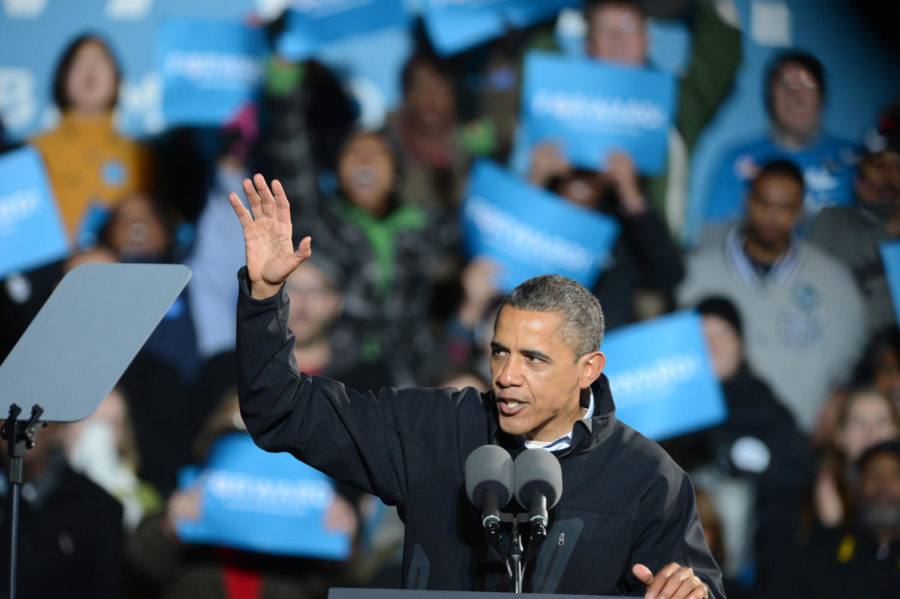Obama’s next four years
Photo: Huiling Wu/ Iowa State Daily
President Barack Obama speaks at his final campaign rally Monday, Nov. 5, in Des Moines’ East Village. Nearly 20,000 people turned out for the event.
January 24, 2013
The second term of President Barack Obama’s presidency began privately in a Sunday inauguration ceremony and publicly Monday, Jan. 21 with his chilly inauguration on the steps of Capitol Hill.
Historically, presidents have had a harder time pushing through legislation in their second term due to a loss of political capital, changes in party control of Congress, and a less enthused public. But, after listening to his inauguration speech, it is thought that Obama wants to reverse this trend with a commitment to a variety of issues in his second term.
“[He will be] making sure Obamacare is implemented and protected from abolition or major changes by Republicans,” said Steffen Schmidt, professor of political science. “Second, Obama will push for more revenue through taxes and fees.”
Since its passage in Congress in 2010, “Obamacare,” which mandates health insurance for all Americans, has been the target of conservative attacks and was arguably the catalyst which propelled Republicans to control of the House of Representatives in the 2010 elections.
The U.S. Supreme Court upheld this portion of the law last summer and it looks as if it will be fully implemented in Obama’s second term. Obama will look to oversee the final touches on his signature legislation piece from his first term.
“Third, he plans at least some gun reforms,” Schmidt said.
David Peterson, professor of political science, also reflected on gun reform, but stressed that it will be very difficult for Obama to push through certain reforms because of the Republican-controlled House of Representatives.
“It is pretty clear Obama will be pushing gun control,” Peterson said. “It wasn’t his plan on election night, but it has been added to his agenda since Newtown. … But gun control won’t go anywhere because it’s not as popular as other issues.”
Peterson went on to say that any Republican lawmaker who votes for new gun restrictions may be subject to primary challenges for their seat because they will be seen as not conservative enough.
One issue which Peterson said will be tackled by both parties is immigration.
Immigration reform has been an issue for decades, but after the recent elections, in which Obama brought in roughly 70 percent of the Latino vote, Republicans will be a bit softer than they have in the past.
“There will be real, long-term challenges to the GOP if they continue to block immigration reform,” Peterson said. “That is why they are now sympathetic to the issue.”
Schmidt also suggested that immigration reform will be seriously addressed in the next four years.
“I know for a fact that Obama will push for a series of steps to provide a path to legalization and maybe even citizenship for 11 million or so people who are in the [United States] illegally,” Schmidt said.
The next four years will confirm whether or not Obama, and by extension Congress, will follow through on several of these issues.
Peterson also remarked that much of the success of tackling some of these issues will rest on what is known as the “Hastert Rule.”
This unwritten rule in the House of Representatives, which is named after former Speaker of the House and Republican Congressman Dennis Hastert, is a policy by which House speakers will not bring legislation to the floor unless it has a majority of the majority of the ruling party in support of it.
In today’s political climate the majority of House Republicans will have to support an issue in order for it to be brought to a vote in the House. This rule was broken recently when a group of moderate Republicans sided with Democrats to get past the “fiscal cliff” last December.
“The fundamental question is how the GOP is going to decide to behave. For a long time, they operated on the Hastert Rule, but they’ve broken it a few times. If they allow this rule to slip, it will allow moderate members to join the Democrats,” Peterson said.
“So, if Boehner [the current Speaker of the House] doesn’t enforce the Hastert rule, we might actually get something done.”

















